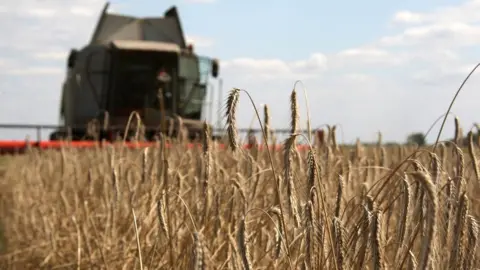Ukraine war could hit global growth, OECD warns
 Getty Images
Getty ImagesThe war in Ukraine could cut global economic growth by more than one percentage point in the first year after the invasion, a report suggests.
The Organisation for Economic Development (OECD) said the impact could also cause a "deep recession" in Russia if it is sustained.
It also warned that the conflict could push up prices globally by about 2.5%.
The organisation called for targeted financial support for those on the lowest incomes in response.
Costs were already going up due to increased demand as Covid restrictions ease.
But if the moves in commodity prices and financial markets are sustained, consumers could see the rate of inflation, which tracks how the cost of living changes over time, increase even further, the OECD said.
Prices of oil, gas, metals and chemicals essential to fertiliser production, for example, have jumped as concerns over supplies from the region increase.
Although Russia and Ukraine only make up a small percentage of the global economy, they are huge producers of raw materials.
The OECD assumes in its new research that oil prices will remain elevated by one-third, gas by 85% and wheat by 90%.
Outside Russia and Ukraine, the organisation suggested that most pain would be felt in Europe, with up to 1.4% knocked off the economy.
Europe is more dependent on Russia and Ukraine for supplies of energy as well as food. The countries have, in the past, been described as the "breadbasket" of Europe.
Those countries "that have a common border with either Russia or Ukraine" would feel the impact most, while bearing the brunt of refugee flows from Ukraine, the OECD said. The price shock, however, might be felt more keenly by those in developing countries.
It added that governments could soften the latest blow for household budgets with a "targeted fiscal response".
"Well-designed and carefully targeted fiscal support could reduce the negative impact on growth with only a minor extra impetus to inflation."
It suggested that in some countries this could be funded by a one-off windfall tax on oil and gas companies to help households cope with higher bills.
Spain has already announced something similar, although the UK has so far largely resisted. The government argues that a windfall tax would stop companies investing in the UK.
The group of developed economies also said that central banks should mostly stick to the interest rate plans set out before the conflict broke out.
"Monetary policy should remain focused on ensuring well-anchored inflation expectations," it said.
"Most central banks should continue their pre-war plans, with the exception of the most affected economies, where a pause may be needed to fully assess the consequences of the crisis."


The war has dominated headlines in every corner of the globe - but between them, Ukraine and Russia account for a relatively tiny part of the world's economy, just £1 in every £50.
However, it's what they produce - one-third of the world's wheat exports, one-fifth of its gas and a tenth of its oil, not to mention vital manufacturing ingredients such as nickel and palladium - that means the conflict universally hits prosperity.
If those commodity prices remain at recent elevated levels (and that's not certain), the OECD reckons it will dampen - but not eradicate - what it previously expected to be a "brisk pace" of global growth of 4.5%, delaying a return to the norms of the pre-pandemic era.
It's the pockets of households and businesses, however, that'll suffer most, from a painful and prolonged bout of accelerating price rises of staple goods.
The OECD is urging governments to ease the burden, perhaps using windfall taxes to redistribute funds from energy producers to consumers. Spain is doing just that, but other governments are fully aware that they're more reliant than ever on energy giants to step up and help keep supply plentiful and affordable.
But there's a limited amount even the most eager and well-funded government can do. And it's those in places where the state is least likely, or able, to help which may feel the burden most. They are the very places that were already struggling to cast off the economic shadow of the pandemic.
